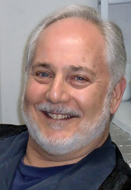Repaying an Immigrant for Teaching Me How to Steal, Long Island, May 1955
Fannie tried to teach me how to steal spring, but it’s taken years to get the knack.
First I had to imagine a 6-year-old refugee with a rag doll disembarking circa 1892
in New York after weeks of skulking across Europe—after months of seasickness—
to escape the pogroms spilling out of Russia that once again turned Kiev’s streets
into anti-Semitic free-for-alls—age-old atrocities flooding through the Ukraine—
in cracking bones, in mobs, in flying bricks—hatred, then panic choking its cities
like Black Sea dreck—until one moonless night her nana foresaw the Covenant
being restored, so they fled clutching cloth bags to the dream called Amerika,
where the lucky ones could fill up on chutzpah and bargain for a better deal.
Fannie paid the butcher by the synagogue his shiny coins and turned left,
heading straight for the lawn of the unfenced house on Springfield Blvd.
She pulled fabric shears from her apron pocket as if doing a magic trick
and stood like a woman in her own yard praying by that bright purple
burning bush, stealing her share of the promise with one clean cut,
lilacs overflowing a large mayonnaise jar beside the used teabags
piling up on her rickety table. They scented the attic apartment
my parents had fixed up so she’d have a place to live above us
on her own; to keep her face from turning blacker-and-bluer
like a parcel with forwarding addresses scribbled across it,
sent off from one ungrateful son or daughter to another.
My right hand put a domino down to block Fannie’s
as my left turned a chicken foot from her soup pot
to help me chew skin and tendons from its toes,
the only two promises spring held for me at 6,
unless you count the crocus’ orange tongue
and the sting of my father’s leather belt;
or the leer in a halo of cigarette smoke
warping anonymous lips as it moved
hastily toward me from the bushes
of vacant lots on shortcuts home;
and no way to enter her prayers
then about loss and acceptance
as on nights I slept next to her
watching sparks in the darkness
begin dancing upon her dancing lips.
But in a bit over two years, I’d be getting high
on bus exhaust on the long ride home from Jamaica
after we received The Ten Commandments at the Loew’s
Valencia Movie Palace. My denims were soaked from following
Charlton Heston all the way through the parted Red Sea to freedom
with the rest of the audience—everyone filled with awe as we emerged.
I was certain my voice would be turning by the time I reached my bus stop,
that I’d wake up in the morning with thick hair growing between my legs and
down to my shins. It was going to be much more than an hour since Fanny had
pressed those two new quarters into my hand in the lobby and whispered, “Now
find your way home.” When I finally knew I had arrived, gratitude started welling
up as from an oasis spring, and I was still lost there in that lobby of deliverance,
among towering adults—helplessly watching Fannie disappear into the reeds.
 Stephen Toskar is a longtime resident of Japan. His poems have appeared in Arc Poetry Magazine, Tokyo Poetry Journal, Chattahoochee Review, and Chandrabhaga, as well as in the anthologies Manifestations and Farewell to Nuclear, Welcome to Renewable Energy. Living on the northern island of Hokkaido with his wife and young son, he is a professor in the Dept. of International Language Studies at Hokkaido Bunkyo University, where he also teaches in the graduate school of Global Communication Research.
Stephen Toskar is a longtime resident of Japan. His poems have appeared in Arc Poetry Magazine, Tokyo Poetry Journal, Chattahoochee Review, and Chandrabhaga, as well as in the anthologies Manifestations and Farewell to Nuclear, Welcome to Renewable Energy. Living on the northern island of Hokkaido with his wife and young son, he is a professor in the Dept. of International Language Studies at Hokkaido Bunkyo University, where he also teaches in the graduate school of Global Communication Research.

